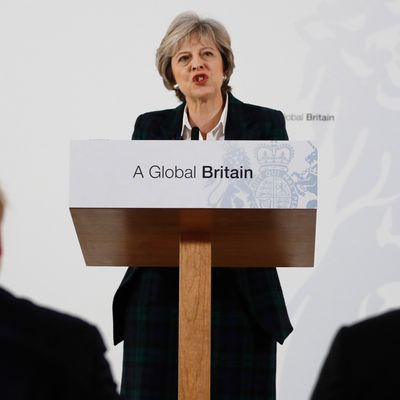
Breaking up is hard to do, but as British Prime Minister Theresa May made clear in her major Brexit speech Tuesday, the United Kingdom wants a clean, hard split with the European Union. May delivered the first major address on the Britain’s exit plans, saying unequivocally that the U.K. would not seek any “half in, half out” plan. “We do not seek to adopt a model already enjoyed by other countries,” May said, “We do not seek to hold on to bits of membership as we leave.”
Here’s what the vision of a clean break means in practical terms: Britain will most certainly leave the single market. The United Kingdom wants to regain control over immigration — a major sticking point among those who supported the Brexit referendum last year. But that’s incompatible with the E.U.’s central tenets of the “four freedoms,” May explained:
“European leaders have said many times that membership means accepting the “four freedoms” of goods, capital, services and people. And being out of the EU but a member of the single market would mean complying with the EU’s rules and regulations that implement those freedoms, without having a vote on what those rules and regulations are. It would mean accepting a role for the European court of justice that would see it still having direct legal authority in our country.
It would to all intents and purposes mean not leaving the EU at all.”
“Let me be clear,” May declared, “what I am proposing cannot mean remaining in the single market.” Instead, May said, Britain would negotiate a “bold and ambitious” new trade agreement that would give Britain access to the European single market — though she did not mention many details on how that might play out.
May, however, explicitly said that a “no Brexit deal” was better than a bad deal for Britain, and warned Europe against any punitive measures it might take during its exit.
“I must be clear. Britain wants to remain a good friend and neighbour to Europe. Yet I know there are some voices calling for a punitive deal that punishes Britain and discourages other countries from taking the same path.
That would be an act of calamitous self-harm for the countries of Europe. And it would not be the act of a friend.”
May tried to add a little muscle to the threat, saying if the European Union did not negotiate a favorable trade deal, or tried to block access to the single market, Britain would “set the competitive tax rates and embrace the policies that would attract the world’s best companies” — essentially transforming itself into a tax haven, according to the harsh criticism from Labour Party leader Jeremy Corbyn:
Brexiters likely found a lot to like in May’s speech; its opponents, including many in the Labour Party, not so much. The reaction from the European Union was mixed. Some questioned if Britain was asking too much, for too little in return, while others seemed resigned to the reality ahead:
Members of Parliament will vote on the final deal between the United Kingdom and the European Union, and negotiations are set to begin in March.
This post has been updated throughout.





























